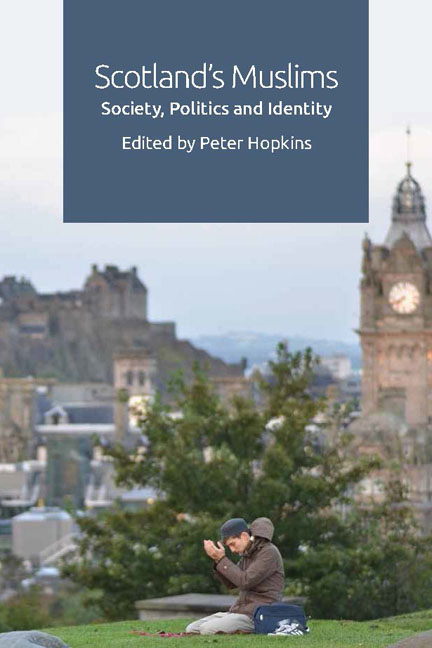Book contents
- Frontmatter
- Contents
- List of Figures and Tables
- Acknowledgements
- Notes on the Contributors
- 1 Introduction Scotland's Muslims: Early Settlement, Current Context and Research Themes
- 2 Health The Health Profile of Muslims in Scotland
- 3 Education Educational Outcomes of Muslim Pupils in Scotland and Parents' Mobilisation of Different Forms of Capital
- 4 Political Participation Young Muslims' Political Interests and Political Participation in Scotland
- 5 Gender and Migration The Role of the ‘Other’ Woman in Shaping the Subjectivities of Recent Muslim Migrant Women to Scotland
- 6 Sexuality Scottish Muslim Gay Men and the Troubling Intersection of Sexuality and Religion
- 7 Young People Muslim Youth in Scotland: Politics, Identity and Multicultural Citizenship
- 8 Generational Relations Gender and Generational Relations for Muslim Women in Scotland
- 9 Heritage Feeling Scottish and Being Muslim: Findings from the Colourful Heritage Project
- 10 Multiculturalism Multiculturalism and Scotland: ‘Bringing the Outside into the Middle’
- 11 Media Muslim Engagement with the Mainstream Media in a Scottish Context
- 12 Representation Representing Islam at the Edinburgh International Book Festival
- 13 Integration Halal Scots: Muslims' Social Integration in Scotland
- Index
2 - Health The Health Profile of Muslims in Scotland
Published online by Cambridge University Press: 23 June 2018
- Frontmatter
- Contents
- List of Figures and Tables
- Acknowledgements
- Notes on the Contributors
- 1 Introduction Scotland's Muslims: Early Settlement, Current Context and Research Themes
- 2 Health The Health Profile of Muslims in Scotland
- 3 Education Educational Outcomes of Muslim Pupils in Scotland and Parents' Mobilisation of Different Forms of Capital
- 4 Political Participation Young Muslims' Political Interests and Political Participation in Scotland
- 5 Gender and Migration The Role of the ‘Other’ Woman in Shaping the Subjectivities of Recent Muslim Migrant Women to Scotland
- 6 Sexuality Scottish Muslim Gay Men and the Troubling Intersection of Sexuality and Religion
- 7 Young People Muslim Youth in Scotland: Politics, Identity and Multicultural Citizenship
- 8 Generational Relations Gender and Generational Relations for Muslim Women in Scotland
- 9 Heritage Feeling Scottish and Being Muslim: Findings from the Colourful Heritage Project
- 10 Multiculturalism Multiculturalism and Scotland: ‘Bringing the Outside into the Middle’
- 11 Media Muslim Engagement with the Mainstream Media in a Scottish Context
- 12 Representation Representing Islam at the Edinburgh International Book Festival
- 13 Integration Halal Scots: Muslims' Social Integration in Scotland
- Index
Summary
INTRODUCTION
Human happiness and well-being are, to a large extent, dependent upon the health of the individual. Similarly, healthy populations are an important prerequisite for societal progress and prosperity (Marmot et al., 2010; World Health Organization, 2015). In order to maximise individual and societal well-being, it is important that the health of all members and sections – that is, irrespective of age, sex/gender, disability, ethnicity, faith or any other protected characteristic – is maximised. A growing body of evidence, however, points to substantial, persistent differences in health outcomes between different ethnic and religious groups. There is, then, an imperative to develop societal and healthcare strategies that are responsive to the aspirations and needs of the diverse populations that now characterise the UK and many other industrialised countries (see, for example, Bhopal, 2013 or Ingleby et al., 2012, for an overview). Insight into the health of Muslims in Scotland is integral to such efforts. In this chapter, we discuss the health profile of Muslims living in Scotland, outline some of the factors shaping health among this diverse group and consider ways of addressing the healthcare needs of Muslims within the context of Scottish healthcare services.
HISTORY AND DATA AVAILABILITY
To understand the current health situation of Muslims in Scotland, it is important briefly to appraise the history of Muslim settlement into Scotland. As outlined in Chapter 1, the migration of Muslims into various parts of the UK started in the early nineteenth century. The first wave of migrants were people from the colonies of the British Empire, including Yemen, India and Malaya (Malaysia) (Ansari, 2004). Since then, migration of Muslims into Scotland has been driven by a need for labour, in particular in the trade and manual sectors, but also by interest in pursuing education, in particular among students from affluent families in South Asia (Ansari, 2004; Maan, 1992). Today, Pakistanis represent the largest ethnic groups among Muslims in Scotland, followed by Indians, Bangladeshis and Arabs. The Scottish Muslim community represents people from a number of different countries and with differing migration histories, ethnic identities and socioeconomic circumstances (Scottish Government, 2011). This diversity has increased further as asylum seekers and refugee communities from across the wartorn Middle East and parts of Africa have settled in Scotland in recent years (Scottish Refugee Council, 2013).
- Type
- Chapter
- Information
- Scotland's MuslimsSociety, Politics and Identity, pp. 25 - 55Publisher: Edinburgh University PressPrint publication year: 2017

